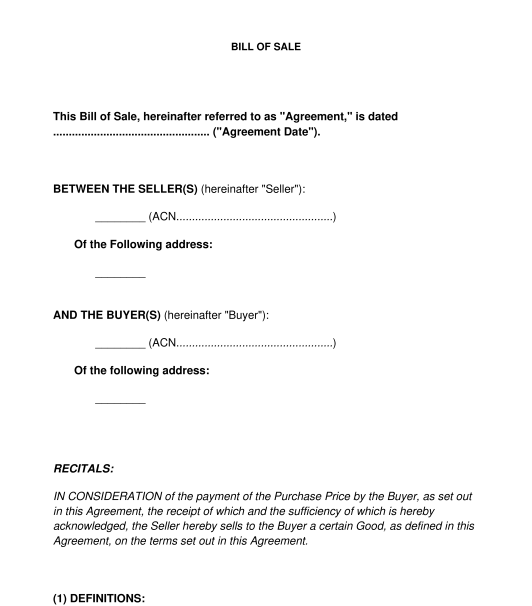 01/10/2025
01/10/2025

Answer a few questions and your document is created automatically.

Your document is ready! You will receive it in Word and PDF formats. You will be able to modify it.

A Bill of Sale is a document that is used to transfer ownership of a good or goods from a seller to a buyer. It acts as a proof of purchase, and is usually exchanged at the time that the ownership is actually transferred (for example, when car keys are handed over in exchange for cash). A Bill of Sale identifies the goods that are being transferred and allows the buyer to prove ownership of the goods, if there is a later dispute. This Bill of Sale is not for use in real estate transactions.
A Bill of Sale serves quite a different purpose from a Contract for Sale of Goods, (or a Vehicle Sale Agreement, in the case of a vehicle), although these documents look quite similar and may have many things in common.
A Contract for Sale of Goods is generally signed and exchanged between the parties ahead of time. By signing the document, the parties are agreeing that on some future date, the buyer will pay the agreed price for the goods, and the seller will hand the goods over to the buyer. A Bill of Sale is different - it serves as a proof of purchase for the buyer, and confirms that the buyer has actually paid for the goods, and is now the owner of the goods.
A Bill of Sale is used to record the transfer of ownership of an asset. Often this coincides with payment being made for the asset, but it does not necessarily have to.
A General Receipt is used to acknowledge that something (usually money) has been received.
In Australia, it is not mandatory to have a Bill of Sale for most transactions. However, for many transactions, especially those involving high value assets or complex arrangements (such as a business sale), a Bill of Sale is very useful for managing risk for both parties.
In the context of this Bill of Sale, "title" in an asset refers to the legal ownership of the asset. For example, if we say that title in a piece of machinery transfers from the seller to the buyer once the purchase price is paid, then as soon as the seller receives the money, the buyer becomes the legal owner. It does not matter if the machinery is still actually located in the seller's warehouse (waiting to be collected by the buyer), because as far as the law is concerned, "title" in the machinery has transferred to the buyer.
Before finalising a Bill of Sale, the parties should actually be ready to transfer the relevant asset(s) from the seller to the buyer.
Therefore, in many cases, a Bill of Sale is used after the parties have already signed a sale contract - such as a Contract for Sale of Goods, a Vehicle Sale Agreement, or a Business Sale Agreement.
This document can be prepared by the buyer or the seller. It is a good idea to provide as much detail as necessary so that the parties, the goods, the purchase price, and the various terms of the agreement can easily be identified.
Once the document has been prepared and before it is signed, make sure that both parties receive a copy of the document. Both parties should be given some time to review the document to make sure that their details are correct, that they understand the various terms, and that they are happy with the various terms.
At the time when ownership of the goods is transferred to the buyer (for example, when the buyer actually pays for and collects the goods), the parties should sign copies of the document. Both parties will need a copy of the document for their own records. Therefore, at least two copies of the document may need to be printed, so that each party can keep a signed copy. If the parties are individual persons (rather than companies) then they can have their signatures witnessed by independent witnesses who are aged over 18. They cannot witness each other.
Both parties should then keep a copy of the document for their own records.
In Australia, it is not usually mandatory to have witnesses for a Bill of Sale. However, witnesses are useful for evidentiary purposes so they are recommended for high value or high risk transactions. If there is ever a dispute over the Bill of Sale, witnesses can help to prove that each party's signature is valid.
Witnesses should be independent adults (aged over 18), who have the mental capacity to understand what they are doing. They should not be related to one of the parties.
A Bill of Sale in Australia is subject to general principles of contract law.
If goods are being sold to the public, then the Australian Consumer Law which is set out in the Competition and Consumer Act 2010 (Commonwealth), may also be relevant.
You fill out a form. The document is created before your eyes as you respond to the questions.
At the end, you receive it in Word and PDF formats. You can modify it and reuse it.
Bill of Sale - sample template to fill out Word and PDF
Country: Australia